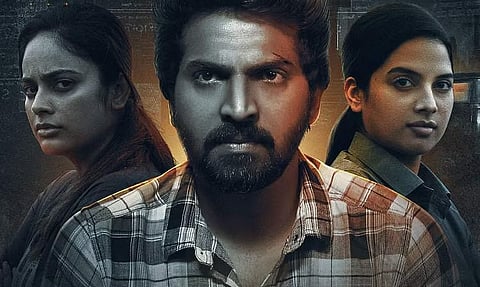

Picking the right milestone film is a gamble. While most actors go for genres or characters that always work for them, some take the road not taken and risk with roles that make them step out of their comfort zone. While not playing to one’s strengths is risky enough, it is a more perilous bet to hand your landmark film to a debutant director. With his 25th Ranam- Aram Thavarel, Vaibhav strikes the right chord. He goes diametrically opposite to his strong comedy suit and plays a more restrained, straight-faced character in an interesting investigation thriller, helmed by first-time filmmaker Sherief.
In Ranam, Vaibhav is a co-director turned facial reconstruction artist, who, in addition to reconstructing the faces of deformed dead people, also writes crime stories completing incomplete investigations for police officials. He gets embroiled in one such serial killing case, as he tries to connect the dots to find the perpetrator.
There are rather long portions in Ranam that don't feature Vaibhav at all, being yet another bold move. Throughout the film, Vaibhav is serious, with a salt-and-pepper look, always lost in thoughts, and mostly sharing his two cents through cryptic dialogues like, “Nammala thedi oru vishayam varudhu na adhuku oru karanam iruku.” He takes the back seat in this film which is more about the victims of the crime, but he is also the hero at the end of the day, albeit in a subtle way. While Vaibhav plays Siva to perfection almost like the character is his extended personality, it’s some of the attributes of his character that could have been explored better.
Although a flashback conveys why he had to transition from a chirpy co-director to a silent facial reconstructionist, the film is not thorough with how a film aspirant turns to a life of sketching (well, the crime story writing part is understandable still). Further, the film also throws in medical conditions like selective amnesia and a very interesting type of stroke, but they’re not explored much, and the latter especially, does not add much value to his character and ends up feeling like a convenient plot device.
At the heart of Ranam is a psychological disorder, which the filmmaker argues and makes a case for being more of a fetish or a habit. Based on a controversial judgement that the abovementioned “disorder” is not a crime, director Sherief mixes worlds of redemption, revenge and taking justice unto one's hands to present an interesting mix of a film, that makes us leave theatres with the perplexing question of what is indeed right or wrong.
As the disorder is the proof of the pudding, the reveal naturally comes pre-climax, until which several modus operandis are teased at. There are missing dead bodies, burnt body parts in boxes, and embalmed dead bodies without organs, to name a few. While the loose ends are eventually tied up quite neatly, some of these diversions are left unexplained. For example, Vaibhav asks what purpose could a criminal have with the organs of dead people. Well, this question poses a great red herring, as we wonder what the crime could be about. However, the explanation of the crime does not directly have an answer to this question, leaving us to make assumptions.
When it comes to perpetrators, there are not one but two red herrings, and so when the third potential perp is hinted at, you know it is them after all. In spite, Ranam gets all the more engaging at this point, as you’re curious to know the reasons for the crime. With a convoluted non-linear screenplay that fits well into the puzzle eventually, Ranam argues in favour of the popular Athichudi ‘Aranai Maravel’ which is restated as ‘Aram Thavarel’ in this film. It talks about why it is important to take up any opportunity to do a good deed, even if it goes against the judiciary or another crime itself. To put it simply, the film’s message can be summarised with one dialogue from the film itself, “Inga elaa unmaiyum adhukaana nyayatha thedikum. Indha unmaikum nyayathukkum nadula namma yaar?”
Another fascinating aspect of the film is its three female leads. Saras Menon’s character is more of a cameo, but it is important to cross all T’s and dot all I’s at the end of Ranam. Nandita Shwetha only makes an appearance in the second half, but her character Kalki, ends up as the soul of the film. For Tanya Hope, her character Indhuja, a police officer, is unlike her previous characters. She is bold and determined, but that’s just about it. While it was definitely a breath of fresh air to see a woman at the helm of things, I wish I got to know more about Indhuja or why she allows Siva to solve her case, as she only gives orders. But again, that story would probably be a film of itself.
In the end, Ranam has its shortfalls, no doubt. Yes, too many themes are addressed, but most of them have satisfying payoffs. Yes, some characterisations could have been better than others, but Vaibhav’s experimentation hits the ball out of the park. The film can be witnessed through Indhuja, Siva or Kalki’s perspectives, all different, but all valid. Rest assured, when you walk out of the theatres, you know who’s the biggest evil of the tale (both the person and the problem). Yet, you are also in deep thought about the ethicality of the actions taken up by the protagonists, potentially making no one the 'hero' of the film.
Director: Sherief
Cast: Vaibhav, Nanditha Shwetha, Tanya Hope, Saras Menon, Suresh Chakravarthy
Rating: 3/5